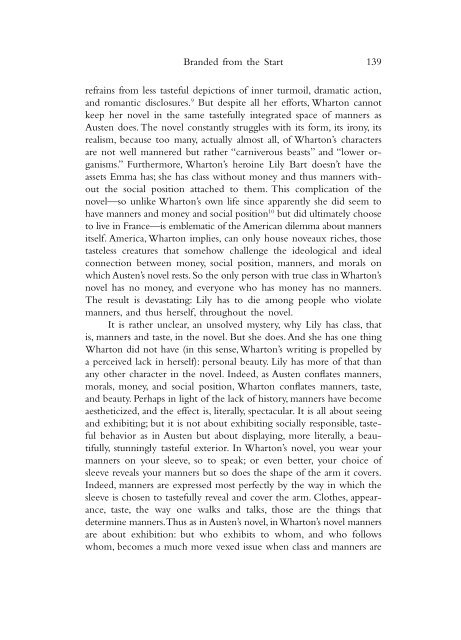Create successful ePaper yourself
Turn your PDF publications into a flip-book with our unique Google optimized e-Paper software.
Branded from <strong>the</strong> Start<br />
139<br />
refrains from less tasteful depictions <strong>of</strong> inner turmoil, dramatic action,<br />
and romantic disclosures. 9 But despite all her efforts, Wharton cannot<br />
keep her novel in <strong>the</strong> same tastefully integrated space <strong>of</strong> manners as<br />
Austen does. The novel constantly struggles with its form, its irony, its<br />
realism, because too many, actually almost all, <strong>of</strong> Wharton’s characters<br />
are not well mannered but ra<strong>the</strong>r “carniverous beasts” and “lower organisms.”<br />
Fur<strong>the</strong>rmore, Wharton’s heroine Lily Bart doesn’t have <strong>the</strong><br />
assets Emma has; she has class without money and thus manners without<br />
<strong>the</strong> social position attached to <strong>the</strong>m. This complication <strong>of</strong> <strong>the</strong><br />
novel—so unlike Wharton’s own life since apparently she did seem to<br />
have manners and money and social position 10 but did ultimately choose<br />
to live in France—is emblematic <strong>of</strong> <strong>the</strong> <strong>American</strong> dilemma about manners<br />
itself. America, Wharton implies, can only house noveaux riches, those<br />
tasteless creatures that somehow challenge <strong>the</strong> ideological and ideal<br />
connection between money, social position, manners, and morals on<br />
which Austen’s novel rests. So <strong>the</strong> only person with true class in Wharton’s<br />
novel has no money, and everyone who has money has no manners.<br />
The result is devastating: Lily has to die among people who violate<br />
manners, and thus herself, throughout <strong>the</strong> novel.<br />
It is ra<strong>the</strong>r unclear, an unsolved mystery, why Lily has class, that<br />
is, manners and taste, in <strong>the</strong> novel. But she does. And she has one thing<br />
Wharton did not have (in this sense, Wharton’s writing is propelled by<br />
a perceived lack in herself): personal beauty. Lily has more <strong>of</strong> that than<br />
any o<strong>the</strong>r character in <strong>the</strong> novel. Indeed, as Austen conflates manners,<br />
morals, money, and social position, Wharton conflates manners, taste,<br />
and beauty. Perhaps in light <strong>of</strong> <strong>the</strong> lack <strong>of</strong> history, manners have become<br />
aes<strong>the</strong>ticized, and <strong>the</strong> effect is, literally, spectacular. It is all about seeing<br />
and exhibiting; but it is not about exhibiting socially responsible, tasteful<br />
behavior as in Austen but about displaying, more literally, a beautifully,<br />
stunningly tasteful exterior. In Wharton’s novel, you wear your<br />
manners on your sleeve, so to speak; or even better, your choice <strong>of</strong><br />
sleeve reveals your manners but so does <strong>the</strong> shape <strong>of</strong> <strong>the</strong> arm it covers.<br />
Indeed, manners are expressed most perfectly by <strong>the</strong> way in which <strong>the</strong><br />
sleeve is chosen to tastefully reveal and cover <strong>the</strong> arm. Clo<strong>the</strong>s, appearance,<br />
taste, <strong>the</strong> way one walks and talks, those are <strong>the</strong> things that<br />
determine manners. Thus as in Austen’s novel, in Wharton’s novel manners<br />
are about exhibition: but who exhibits to whom, and who follows<br />
whom, becomes a much more vexed issue when class and manners are
















